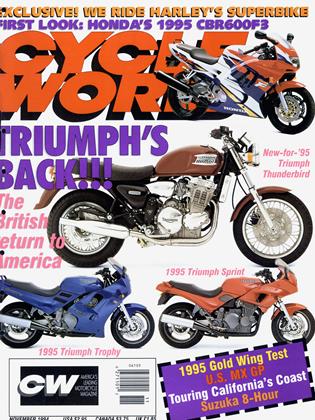Clipboard
RACE WATCH
Cagiva out of GP, into Superbike?
Italy’s financial problems, and the resulting uncertain business climate, finally is about to have effects in motorcycle roadracing.
Cagiva, whose motorcycle operations reportedly have been troubled by cashflow problems for some time now, recently announced that it has secured a $60 million credit package from a consortium of seven Italian banks.
But bankers apparently were unwilling to approve the use of cash in GP racing, an enterprise not directly connected to the majority of the bikes upon which Cagiva bases its motorcycle business: Ducatis. As a resultthough by presstime there was no confirmation of this from Cagiva-it seems that 1994 could be Cagiva’s last season in grand prix racing. If it comes, this sudden and drastic policy shift, according to one observer, “would yield the refinanced Cagiva Group substantial cost savings in an area without any direct product spin-off.”
Even if it does withdraw from the GP wars, however, Cagiva will not disappear from big-league racing. According to highly placed European sources, it will instead transfer its considerable expertise and resources to World Superbike. Factory insiders > say that starting in 1996, Cagiva will go Superbike racing with its as-yetunreleased Cagiva-Ferrari Four.
The possible shutdown of the Cagiva GP effort would free up some extremely clever engineers who would be able to devote their time to development of this new motorcycle, set to debut in 1995 as a 920cc streetbike, and in 1996 as a 750cc Superbike. It also would vacate Cagiva’s race shop in Varese, near Italy’s lake district.
In order for the Cagiva-Ferrari to be eligible for Superbike racing in ’96, the company would have to build 200 units by March 1 of that year. That should be no problem. What may be more interesting, should these changes actually take place, will be seeing whether a rivalry between the two in-house teams develops. Observers say that because they’re based 250 miles apart-Ducati runs its operations from Bologna-there would be no such rivalry. Maybe. And maybe, after all is said and done, Cagiva will find a way to stay in grand prix racing.
Supercross catches some AIR
When supercross racing kicks off its planned 15-race 1995 season in January, it will do so without the help and guidance of the American Motorcyclist Association.
The Mickey Thompson Entertainment Group (MTEG), Pace/Supersports and SRO Motorsports, who produce and promote supercross events, announced in mid-August the formation of American/International Racing, or AIR, to sanction the operation of the supercross series. The promoters also announced that they had hired Roy Janson, the AMA’s director of professional racing, to be AIR’s executive director.
Both these changes came as surprises to AMA officials. Tom Mueller, the AMA’s vice president of sports marketing, characterized what happened as “Changes that were made for us,” in the wake of stalled contract talks.
Tony Gardea, a spokesman for MTEG, said officials from MTEG, Pace Supersports and SRO decided to go their own way after attempts to negotiate a long-term contract with the AMA fell apart.
“The AMA was never able to agree to a contract for more than one year at a time,” he said. “The producers wanted a long-term agreement, which lends more stability. They were banking on that. About three months ago the AMA came back to the producers and said it didn’t want to sign a longterm agreement. The talks went south, and we basically had to pick it up from there,” he said.
Mueller, meanwhile, says the split was caused by a dispute over series ownership, and television and marketing rights.
“We’d been crossing the TV rights clause out of the contract for the last two years, basically rescinding TV to the promoters. This year they were pretty hot about getting a multi-year agreement regarding television. In May, the promoters requested a fiveyear contract with TV and marketing rights. The AMA was very close to agreeing to that,” Mueller said.
“Then came another set of conferences in which they requested final approval over a lot of sanctioning issues, including scheduling, format, and rule-making. If we had agreed to that, we would have been giving away ownership of the complete series, and we weren’t prepared to do that,” Mueller said.
He added, “Supercross is a very important property, but we got to a scenario where the promoters wanted us to rescind virtually all our rights. That wasn’t our future.”
An additional factor, Mueller said, involved the AMA’s intent to launch its own sports-marketing arm.
“We saw real resistance to that from the promoters,” he said.
That resistance, and other factors, added up to just what the AMA hoped to avoid: The supercross promoters heading out on their own.
Mueller said the AMA now is considering several scenarios, including the formation of its own supercross series.
He added, “Our programs are getting bigger and more popular. We’ve got almost 70 hours of TV this year (for motorcycle racing events). We’re trying to assert a bit of authority, and there’s going to be some resistance to that. Everybody is trying to secure what they think is their property, and that’s why this is pretty inevitable.”
In the wake of Janson’s departure, AMA National Technical Manager Merrill Vanderslice was appointed acting director of competition. □
 View Full Issue
View Full Issue
More From This Issue
-
 Up Front
Up FrontIncident On the Angeles Crest
November 1994 By David Edwards -
 Leanings
LeaningsGs-Ing It
November 1994 By Peter Egan -
 TDC
TDCEngine Architecture
November 1994 By Kevin Cameron -
 Letters
LettersLetters
November 1994 -
 Roundup
RoundupAprilia Reveals Trick 250
November 1994 By Robert Hough -
 Roundup
RoundupSuzuki Gets Savage For 1995
November 1994






